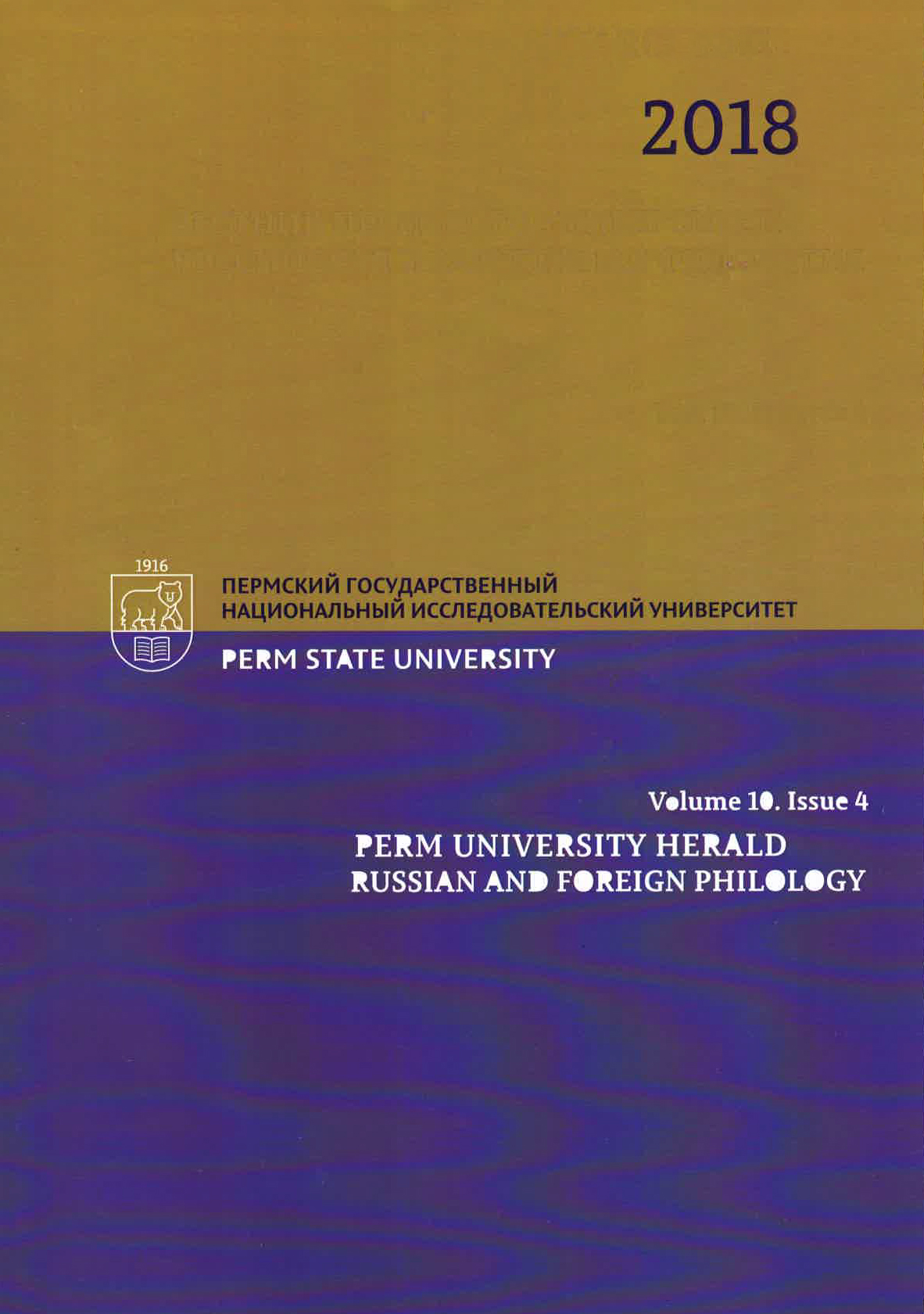THE DICTIONARY OF SNOWBOARDERS’ SOCIOLECT
DOI:
https://doi.org/10.17072/2037-6681-2018-4-53-58Keywords:
culture, subculture, sociolect, snowboarders, dictionary.Abstract
This article deals with the sociolect typical of the snowboarders’ subculture. In the same way as a subculture is a subsystem of culture, formed based on culture as the prevailing ethical, aesthetic and worldview system, social dialect is formed on the basis of lexical systems of the dominant language code and other subcodes. Therefore, elements of the snowboarders’ subculture sociolect are based on the lexicon of the literary language, the youth sociolect, the alpine skiing sociolect and the sociolect of climbers. As a result of borrowing, lexemes often get additional connotations, which are not always obvious for a wide range of people. A solution to this problem is the creation of a complete dictionary of snowboarders’ subculture sociolect, where specific lexemes (including professionalisms, professional jargonisms and terms) would be defined. When collecting the language material, the author used the method of overt observation in the environment natural for snowboarders – on ski slopes, at snowboarding competitions, at the premiere of a snowboard film. In addition, slang words were identified in the Internet resources on the subject in question by means of the continuous sampling method. In order to confirm the collected data, a sociolinguistic experiment was conducted among snowboarders in Perm, in the course of which informants were asked to write as many words as they think are related to the snowboarding jargon. As a result, there were obtained about 200 lexemes regarded by snowboarders as slang. They include terms, professionalisms and professional jargon elements describing the quality of snow, the level of snowboarding skills, equipment, tricks, landscape elements, figures, the performer and the riding style. These elements formed the body of the dictionary of snowboarders’ sociolect, which is at the moment the biggest one among all the known to the author of this article.References
Гаранович М. В. Лексикографическое описание лексики субкультур г. Перми // Социо- и психолингвистические исследования. 2013. Вып. 1. С. 33–38.
Гуревич П. С. Субкультура // Культурология. XX век. Энциклопедия: в 2 т. Т. 1. СПб.: Университетская книга, 1998. С. 236.
Ерофеева Е. В. Вариативность в жаргоне любителей «Формулы-1» // Социо- и психолингвистические исследования. 2013. Вып. 1. C. 64–73.
Ерофеева Е. В. Вероятностные структуры идиомов: социолингвистический аспект. Пермь: Изд-во Пермского университета, 2005. 320 с.
Ерофеева Е. В. Пермская школа социолин-гвистики: итоги работы и перспективы развития // Вестник Пермского университета. Российская и зарубежная филология. 2014. Вып. 2(26). С. 160–171.
Ерофеева Е. В., Кропачева М. А. Локальная вариативность значения жаргонного слова // Вестник Пермского университета. Российская и зарубежная филология. 2016. Вып. 2(34). С. 27–37.
Ерофеева Т. И. Субкультура в лингвистиче-ском освещении // Социо- и психолингвистические исследования. 2013. Вып. 1. С. 5–10.
Ерофеева Т. И. Социолект как инструмент описания языковой ситуации региона // Вестник Пермского университета. Российская и зарубежная филология. 2010. Вып. 1(7). С. 21–25.
Кропачева М. А., Литвинова Е. С. Геймеры как субкультурный и культурный феномен // Социо- и психолингвистические исследования. 2015. Вып. 3. С. 104–108.
Павлова Д. С. Субкультура моделистов работы органов ООН: вербальные и невербальные средства коммуникации // Социо- и психолингвистические исследования. 2013. Вып. 1. С. 86–89.
Слюсаревский Н. Н. Субкультура как объект исследования // Социология: теория, методы, маркетинг. 2012. Вып. 3. С. 117–127.
Щепанская Т. Б. Традиции городских суб-культур // Современный городской фольклор. М.: РГГУ, 2003. С. 27–33.
Wikipedia. URL: https://ru.wikipedia.org/wiki/Сноуборд_(спортивный_инвентарь) (дата обращения: 12.05.2018).
Wikipedia. URL: https://ru.wikipedia.org/wiki/Сноуборд_(вид_спорта) (дата обращения: 12.05.2018).
References
Garanovich M. V. Leksikograficheskoe opisanie leksiki subkul’tur g. Permi [Lexicographic description of the lexis of subcultures in Perm]. Sotsio- i psikholingvisticheskie issledovaniya [Socio- and psycholinguistic studies], 2013, issue 1, pp. 33–38. (In Russ.)
Gurevich P. S. Subkul’tura [Subculture]. Kul’turologiya. 20 vek. Entsiklopediya v 2 t. [Culturology. 20th century. Encyclopedia in 2 vols.]. St. Petersburg, Universitetskaya kniga Publ., 1998. 236 p. (In Russ.)
Erofeeva E. V. Variativnost’ v zhargone lyubiteley «Formuly-1» [Variability in the jargon of “Formula-1” fans]. Sotsio- i psikholingvisticheskie issledovaniya [Socio- and psycholinguistic studies], 2013, issue 1, pp. 64–73. (In Russ.)
Erofeeva E. V. Veroyatnostnye struktury idiomov: sotsiolingvisticheskiy aspekt [Probabilistic structure of idioms: sociolinguistic aspect]. Perm, Perm State University Publ., 2005. 320 p. (In Russ.)
Erofeeva E. V. Permskaya shkola sotsiolingvistiki: itogi raboty i perspektivy razvitiya [Perm school of sociolinguistics: results and prospects for development]. Vestnik Permskogo universiteta. Rossijskaya i zarubezhnaya filologiya [Perm University Herald. Russian and Foreign Philology], 2014, issue 2(26), pp. 160–171. (In Russ.)
Erofeeva E. V., Kropacheva M. A. Lokal’naya variativnost' znacheniya zhargonnogo slova [Local variability of slang words]. Vestnik Permskogo universiteta. Rossiyskaya i zarubezhnaya filologiya [Perm University Herald. Russian and Foreign Philology], 2016, issue 2(34), pp. 27–37. (In Russ.)
Erofeeva T. I. Subkul’tura v lingvisticheskom osveshchenii [Subculture in linguistic interpreta-tion]. Sotsio- i psikholingvisticheskie issledovaniya [Socio- and psycholinguistic studies], 2013, issue 1, pp. 5–10. (In Russ.)
Erofeeva T. I. Sotsiolekt kak instrument opisaniya yazykovoy situatsii regiona [Sociolect as a tool to describe the linguistic situation in the region]. Vestnik Permskogo universiteta. Rossiyskaya i zarubezhnaya filologiya [Perm University Herald. Russian and Foreign Philology], 2010, issue 1, pp. 21–25. (In Russ.)
Kropacheva M. A., Litvinova E. S. Geymery kak subkul’turnyy i kul’turnyy fenomen [Gamers as subcultural and cultural phenomenon]. Sotsio- i psikholingvisticheskie issledovaniya [Socio- and psycholinguistic studies], 2015, issue 3, pp. 104–108. (In Russ.)
Pavlova D. S. Subkul’tura modelistov raboty organov OON: verbal'nye i neverbal’nye sredstva kommunikatsii [Subculture of UNO modelers: verbal and nonverbal means of communication]. Sotsio- i psikholingvisticheskie issledovaniya [Socio- and psycholinguistic studies], 2015, issue 1, pp. 86–89. (In Russ.)
Slyusarevskiy N. N. Subkul’tura kak ob”ekt issledovaniya [Subculture as an object of study]. Sotsiologiya: teoriya, metody, marketing [Sociology: theory, methods, marketing], 2012, issue 3, pp. 117–127. (In Russ.)
Shchepanskaya T. B. Traditsii gorodskikh subkul’tur [Traditions of urban subcultures]. Sovremennyy gorodskoy fol’klor [Modern Urban Folklore]. Moscow, Russian State University for the Humanities Press, 2003, pp. 27–33. (In Russ.)
Snoubord (sportivnyy inventar’) [Snowboard]. Vikipediya [Wikipedia]. Available at: https://ru.wikipedia.org/wiki/Сноуборд_(спортивный_инвентарь). (accessed 12.05.2018). (In Russ.)
Snoubord (vid sporta) [Snowboarding]. Wikipedia. Available at: https://ru.wikipe dia.org/wiki/Сноуборд_(вид_спорта). (accessed 12.05.2018). (In Russ.)




